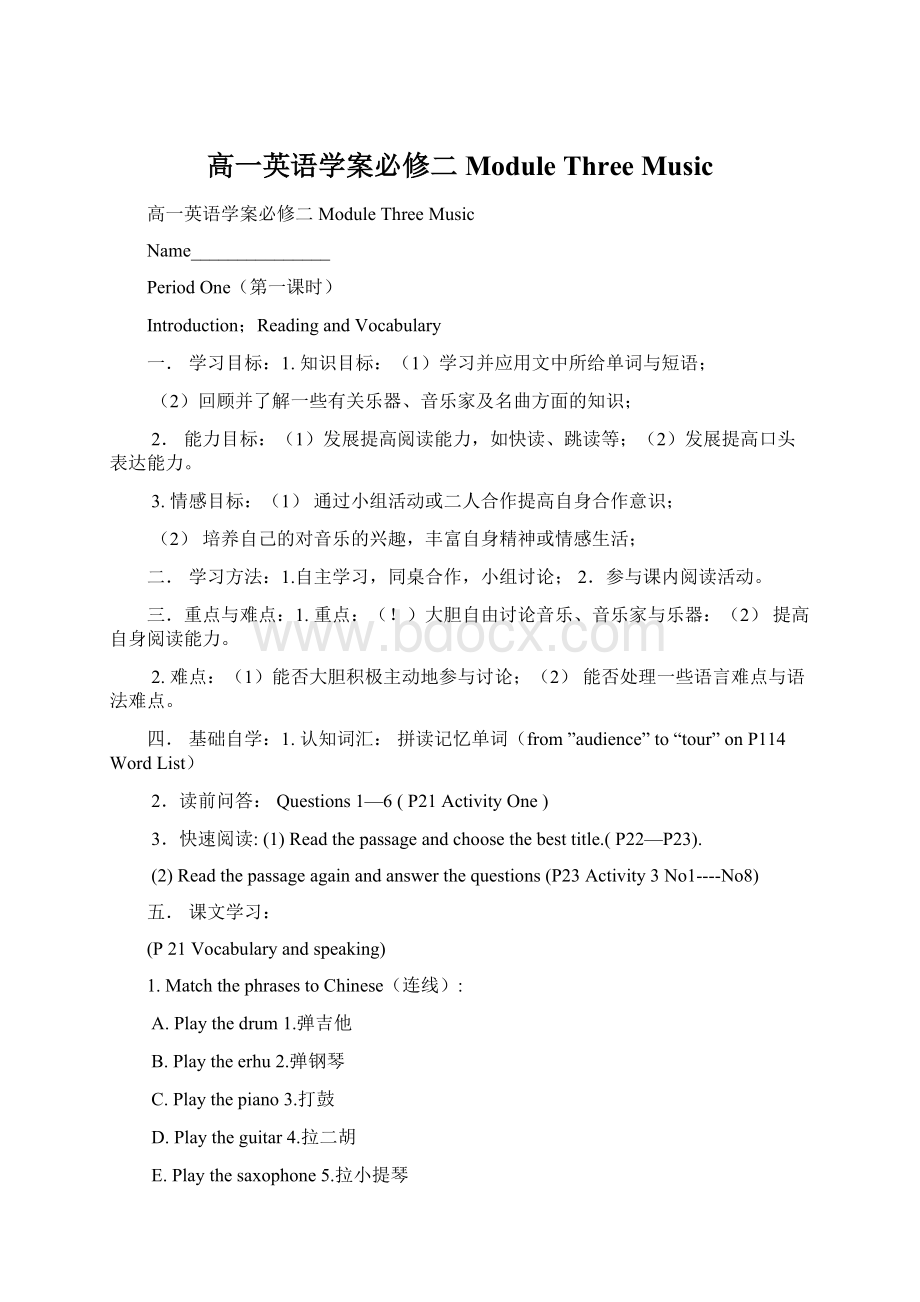高一英语学案必修二 Module Three Music.docx
《高一英语学案必修二 Module Three Music.docx》由会员分享,可在线阅读,更多相关《高一英语学案必修二 Module Three Music.docx(18页珍藏版)》请在冰豆网上搜索。

高一英语学案必修二ModuleThreeMusic
高一英语学案必修二ModuleThreeMusic
Name_______________
PeriodOne(第一课时)
Introduction;ReadingandVocabulary
一.学习目标:
1.知识目标:
(1)学习并应用文中所给单词与短语;
(2)回顾并了解一些有关乐器、音乐家及名曲方面的知识;
2.能力目标:
(1)发展提高阅读能力,如快读、跳读等;
(2)发展提高口头表达能力。
3.情感目标:
(1)通过小组活动或二人合作提高自身合作意识;
(2)培养自己的对音乐的兴趣,丰富自身精神或情感生活;
二.学习方法:
1.自主学习,同桌合作,小组讨论;2.参与课内阅读活动。
三.重点与难点:
1.重点:
(!
)大胆自由讨论音乐、音乐家与乐器:
(2)提高自身阅读能力。
2.难点:
(1)能否大胆积极主动地参与讨论;
(2)能否处理一些语言难点与语法难点。
四.基础自学:
1.认知词汇:
拼读记忆单词(from”audience”to“tour”onP114WordList)
2.读前问答:
Questions1—6(P21ActivityOne)
3.快速阅读:
(1)Readthepassageandchoosethebesttitle.(P22—P23).
(2)Readthepassageagainandanswerthequestions(P23Activity3No1----No8)
五.课文学习:
(P21Vocabularyandspeaking)
1.MatchthephrasestoChinese(连线):
A.Playthedrum1.弹吉他
B.Playtheerhu2.弹钢琴
C.Playthepiano3.打鼓
D.Playtheguitar4.拉二胡
E.Playthesaxophone5.拉小提琴
F.Playtheviolin6.吹萨克斯风
2.Somefamousmusicianswhoplaythenextinstruments(著名的乐手):
Violin:
梅纽因,帕尔曼,吕思清,盛中国,俞丽拿,陈美
Guitar:
JimiHendrix,JeffBeck,JimmyPage,hide,木村好夫(木吉他)
Piano:
鲍蕙荞,朗朗,李云迪,RichardClayderman,
Saxophone:
Kenny.G,
Erhu:
华彦钧,刘天华,闵惠芬,宋飞,
3.Audience听众,观众:
audience在作为集合名词大多以单数形式出现,既可以表示单数意义,也可以表示复数意义。
作主语时,若看作一个集体谓语动词用单数;指集体中的成员时,谓语用复数。
(1)There__________(be)alargeaudienceatthepopconcert.
(2)200audience_________________(watch)thematchatthistimeyesterday>
(3)Theaudience____________/___________(be)veryexcitedbytheshow.
4.different(adj)-___________________(adv)-________________________(n)
与…不同_________________________在…方面不同_____________________
(P22-23Readingandvocabulary)
I.FastReading(快速阅读):
Readthepassagequicklyandchoosethebesttitle:
1.ThreeGreatAustrianComposers.2.ThreeGreatComposersoftheEighteenthCentury(世纪).
3.ThreeGreatChildrenComposers.
II.FastReading:
Readthepassagequicklyandfillinthetableaboutthethreegreatcomposers:
Name
Birthplace(出生地)
Dateofbirthanddeath
Familybackground(家庭背景)
III.Detail-reading(详细阅读/细节阅读):
1.ReadPara1-2(第一和第二段)aboutHaydnandanswer:
(1).whatisHaydnknownas?
(2).HowdidHaydnchangetheformofsymphonies?
(3).HowlongdidheworkineasternAustria?
2.ReadPara3-5(第三—第五段)aboutMozartandfillintheinformation.
Beknownas/called
______________________________
Numbersofpiecesofmusic
_____________
Attheageof________
learnedtoplaytheharpsichord
Attheageof________
Startedtocomposemusic
Attheageof________
PlaytheharpsichordfortheempressofAustria
Bytheageof________
Hadcomposedpiecesfortheharpsichord,piano,violinandorchestras
Stilla______________
Abigstar,touredEuropegivingconcerts
For_______years
HaydnhadbeenfriendswithMozart
3.ReadPara6-8(第六—第八段)aboutBeethovenandanswer:
(1).WhotaughtBeethoventoplaythepiano?
(2).WasBeethovenimpressedbyHaydn?
(3).Didhestopcomposingmusicafterhebecamedeaf?
IV.Consolidation(巩固练习)
ThreeGreatComposersoftheEighteenthCentury
Haydn,“thefatherofthe1______________”,wasthesonofapeasant.Hechangedthesymphony2alongpieceforalargeorchestra.
3_______workedineasternAustriafor30years,HaydonmovedtoLondon,4_________hewasverysuccessful.
Mozartwasacomposer,possiblythegreatestmusical5______________ofalltime.Hehad6________fromaveryearlyage.Bythetimehewas14,Mozarthad7____________manypiecesfortheharpsichord,pianoandviolin,
8__________________(三词短语)fororchestras.Haydnwasdeeply9__________byMozartwhenhefirstmethim.
BeethovenwasborninBonn,Germany.Heshowedmusical10_____________whenhewasyoung.Inhistwenties,hemetbothMozartandHaydn.However,itwasHaydon11________encouragedhimtomovetoVienna.12__________hegrewolder,hebeganto13___14___________.Buthecontinued15______________.
V.Importantlanguagepoints(重要语言点):
1._____________被称作,作为…而闻名;_________________因……而著名;________________为/被…所知
JackieChan________________________people________afilmstar.
Thesmalltown_________________________itshoneypeachesalloverthecountry.
*2.change…into…变成,把……变成;change…for…用……换……
类似的短语还有:
turn…into…进入,使变成,使成为;put/translate…into…把……译成
I’dliketochangethesedollarsintopounds.我想把美元换成英镑。
Canyouchangethis10poundnotefortensingleones?
请你把这张十英镑的钞票换成10张一英镑的好吗?
Pleaseturn/translatethearticleintoEnglish.请把这篇文章译成英语。
3.Havingworkedtherefor30years,HaydnmovedtoLondon,wherehewasverysuccessful.(P22)
=Afterhe_____________________therefor30years,HaydnmovedtoLondon,wherehewasverysuccessful.
havingworked…为现在分词的完成式作时间状语,表示动作发生在主动作之前
如:
在这住了30年他已习惯了这里的生活。
_____________________________herefor30years,hegotusedtothelifehere.
=______________he____________________________herefor30years,hegotusedtothelifehere.
*3.talentn.才能,才干,天资;天才,有才能的人
talent常构成短语:
havetalentforsth./doingsth.在……方面有天分(才能)
4.Bythetimehewas14,Mozarthadcomposedmanypiecesforthepianoandviolin,aswellasfororchestras.
(1)by表示时间“到……为止”,常用于过去完成时和将来完成时中。
BythetimeIgotthere,themeetinghadbeenonforhalfanhour.我到的时候会议已经开始半个小时了。
(bythetime引导的时间状语从句用一般过去时,主句用过去完成时)
Bythetimeyoureachthestation,thetrainwillhaveleft.你到车站的时候,火车可能都已经走了。
(bythetime引导的时间状语从句用一般现在时,主句用将来完成时)
(2)“aswellas”在这里是“和、并且”的意思,连接两个并列成分
Maryaswellasherparentswaspresentattheparty.玛丽和她父母都出席了晚会。
注意:
①aswellas连接主语时,谓语动词的数须与aswellas前的主语的数一致。
②aswellas连接并列成分时,aswellas后面的部分,可以连同aswellas放在句首、句尾。
Aswellasherparents,Marywaspresentattheparty.玛丽还有她的父母出席了宴会。
=Marywaspresentattheparty,aswellasherparents.
Tomboughtsomebooksaswellasadictionary.汤姆买了一本字典和一些书。
=Aswellasadictionary,Tomboughtsomebooks.
③aswellas连接谓语动词时,aswellas后的动词须用动名词形式。
Kateplaysthepianoaswellasswimming.凯特不仅会弹钢琴而且会游泳。
5._______________________/_____/_____…对……留下印象
Iwasdeeplyimpressedby/with/athisspeech.我对他的演讲留下了深刻的印象。
*impress的其他用法:
(1)impresssth.upon/onsb.或者impresssb.withsth.使某人铭记某事物
Myfatherimpressedonmetheimportanceofwork.我父亲使我铭记工作的重要性。
Myfatherimpressedmewiththeimportanceofwork.
(2)impresssthupon/onsth.在某物上面印上某物
Heimpressedhisnameonthebox.他把名字印在盒子上。
6.ItwasHaydnwhoencouragedBeethoventomovetoVienna.是海顿鼓励贝多芬移居维也纳的。
=HaydnencouragedBeethoventomovetoVienna.
(Itwas…who…是强调句,该强调句强调了主语。
)
常用itis/was…who/that结构来突出强调句子的某一成分(一般是句子中主语、宾语或状语)。
ItisIwhoamwrong.是我错了。
=Iamwrong.
Ilostmywatchhere.=_______________________________.我是在这儿掉的手表的。
Hemethisbestfriendinthevery(恰好的)hall.=_________________________________________.
______________________________鼓励某人做某事
7.Ashegrewolder,hebegantogodeaf.随着年龄的增长,他的耳朵变聋了。
____________/____________/_______________/_____________变聋/变瞎/发疯/变坏
VI.Writing(写作):
(根据下列资料模仿课文谢一篇关于歌手韩红的文章)
DescribeHanHongwiththesewords
1.singwellsuccessfulsongwriter
2.bornin1971inTibet(西藏)
3.youngwatchhermothersinganddance
4.attheageofnineprofessional(专业的)traininginBeijing.
5.in1985herfirstnationalprize
6.writesongsin1993
7.song“Hometown”numberoneinChina
VII.Homework(作业):
1.Repeatthepassage(反复朗读22-23页的课文)。
2.Rememberallthenewwordsandphrases.(熟记本课的词汇和短语audience-tour,明天听写)
3.FinishthepassageaboutHanHong.(完成关于韩红的写作)
4.PreviewGrammar1adverbialclauseoftimeandculturalcorner.(预习24页语法1和29页文化角。
)
PeriodTwo(第二课时)Grammar1;Culturalcorner
一.学习目标:
1.知识目标:
(1)了解音乐家叶小刚的生平及业绩;
(2)扩大丰富语法知识;
2能力目标:
(1)发展提高阅读能力;
(2)发展互助合作能力。
3.情感目标:
(1)通过小组活动或二人合作提高自身合作意识;
(2)培养自己的对音乐的兴趣,从我做起,发扬广大中国传统音乐;
二.学习方法:
1.自主学习,同桌合作,小组讨论;
2.课内阅读活动中建议使用演绎法、对比法。
三.重点与难点:
1.重点:
(!
)学习通过合作进行探究:
(2)学习应用时间状语从句。
2.难点:
(1)能否大胆积极主动地参与讨论;
(2)学习如何使用时间状语从句。
四.课文学习:
Culturalcorner文化角(P29)
1.Pre-readingoftheculturalcorner
(1).YeXiaogangbeganstudyingpianoin_____
A1955B1978C1959D1983
(2).Aftergraduation,heworkedattheCentralConservatoryofMusicas_____
AamusicianBalecturerCasingerDanactor
(3).Fromthepassageweknowthefollowingfactsexcept_____.
A.YeXiaogangheldaconcertofsymphoniesinBeijingin1985.
B.YeisfamousformixingChinesemusicaltraditionswithwesternformsandinstrumentation.
C.YeisamemberoftheBeijingmusicgroupEclipse.
D.YeXiaoganghasreceivedmanyprizesonlyinChina.
2.Detail-reading:
Readthepassagequicklyandfillthechart.(P29)
Name__________Sex_____________Nationality____________
Job/Career________Styleofmusic_______________________
Whathedidorhappenedtohiminthefollowingyears(大事记/简历):
1955__________________________________________________________
From1978to1983_______________________________________________
1985__________________________________________________________
1986__________________________________________________________
Since1993_____________________________________________________
1996__________________________________________________________
3.Importantlanguagepoints:
显示出音乐才能(para.1)____________________;担任,担当(para.2)_____________________
因为…而出名(para3)______________________;获得很多奖项(para5)______________________________
4.TranslatethemintoChinese.(翻译句子)
1.YeXiaogang,whowasbornin1955,isoneofagroupofChinesecomposersknownastheNewTide.
2.HeisfamousformixingChinesemusicaltraditionswithwesternformsandinstrumentation.
Grammar1(adverbialclauseoftime时间状语从句)
Worddefinition:
Getwordsfromdefinitions:
______________/____________
apersonwhocomposes/writesmusic
______________/____________
onewhodirectsanorchestraorothersuchgroup
_________________
Onepersonwhosecareer(职业)istosing
___